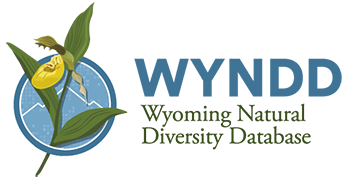Program highlights
- Collected information on invertebrates that are petitioned or listed under the US
Endangered Species Act (ESA) in Wyoming, including:
- Regal Fritillary (Argynnis idalia) butterflies
- Monarch Butterfly (Danaus plexippus)
- Iowa Skipper (Atrytone arogos iowa)
- Large Marble (Euchloe ausonides)
- Western Bumble Bee (Bombus occidentalis)
- Suckley's Cuckoo Bumble Bee (Bombus suckleyi)
- American Bumble Bee (Bombus pensylvanicus)
- Narrow-foot Hygrotus Diving Beetle (Hygrotus diversipes)
- Glacier Forestfly (Zapada glacier)
- More than 225,000 observation records representing over 5,300 invertebrate taxa have been uploaded into WYNDD’s central database.
Expertise
- Experience working with aquatic and terrestrial invertebrates in diverse ecosystems with assorted invertebrate taxa, including mollusks, pollinators, aquatic insects and crustaceans
- Expertise in the identification of:
- Aquatic invertebrates
- Butterflies
- Bees
- Beetles
- Aquatic and terrestrial snails
- Mussels
- Water quality analysis
- Bioassessment using aquatic invertebrates
- Nutrient cycling
- Food web dynamics
- Plant-pollinator interactions
- Pollination networks
- Invasive species ecology
- Statistics
2024 Program Focus
- Add invertebrate observations to the WYNDD database
- Learn more about the abundance, distribution and habitat requirements of invertebrates of management concern
- Develop species expertise for Wyoming bees
- Continue research projects that further our knowledge of invertebrates of management concern
- Conduct surveys that monitor invertebrates and gather information on lesser-known taxa
- Collect information that aids land management decisions in Wyoming


